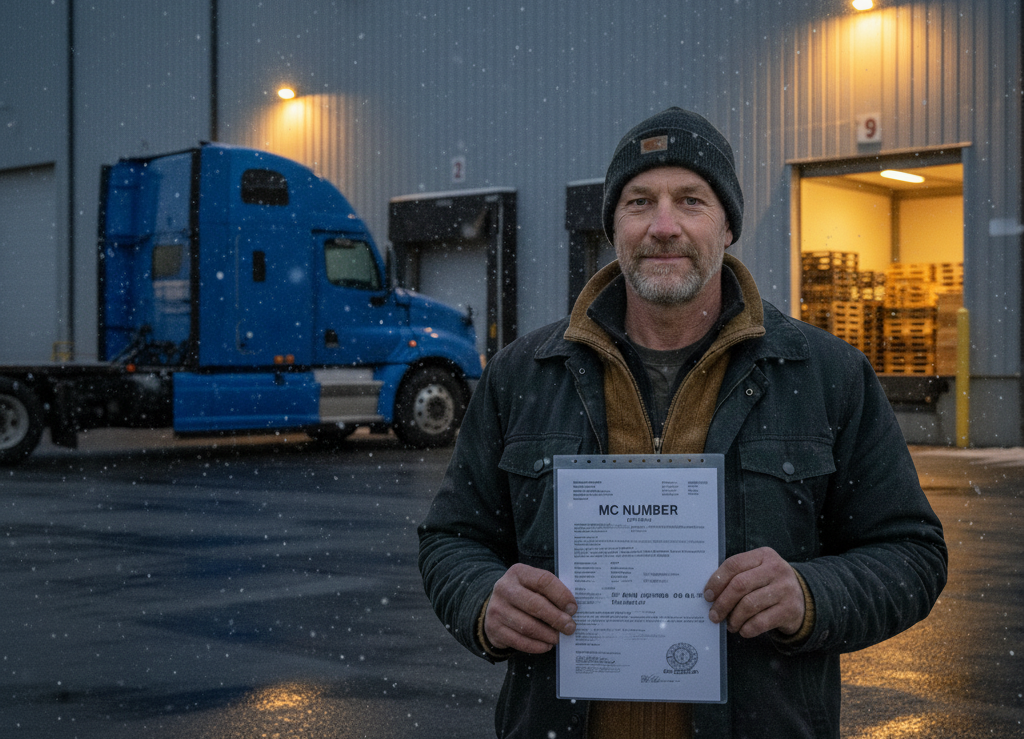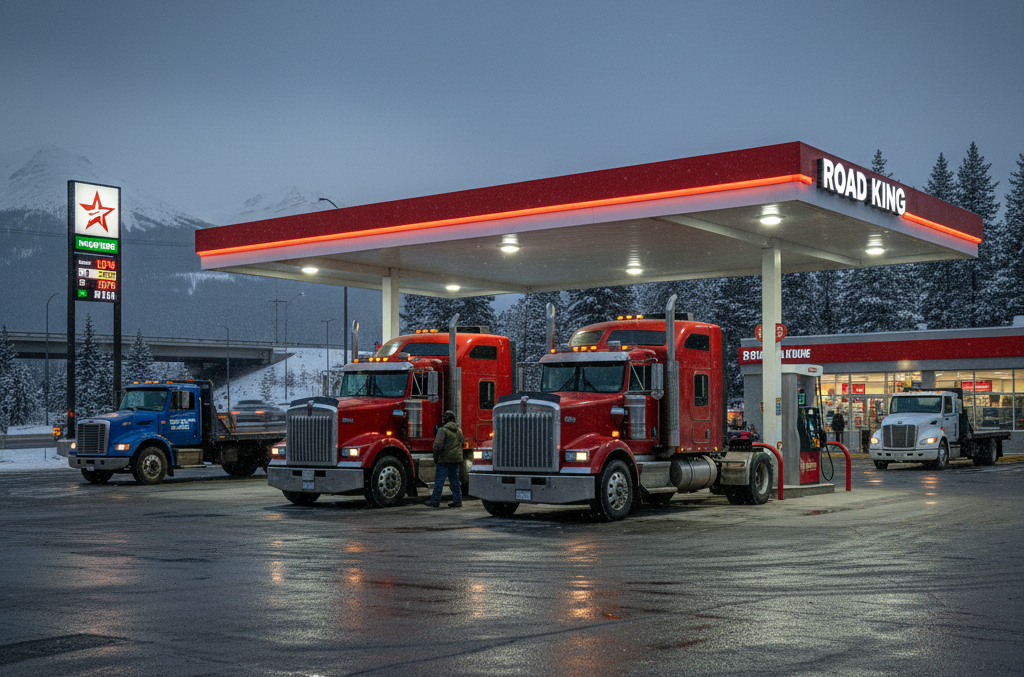The trucking industry can seem a prospective and rewarding career with unique opportunities. However, before choosing this path, it’s crucial to evaluate what being part of this industry truly means. Whether you plan to work for a trucking company, become an independent trucker, or launch your own trucking company, there are numerous factors to consider.
The trucking sector may offer rewards and opportunities, but it also presents a range of challenges, such as long hours on the road, financial risk, and complex regulatory environments.
From obtaining a commercial driver’s license to managing business licenses and permits, every step of the way demands thoughtful planning. Understanding the work, the challenges, and the commitment required is the key to ensuring you’re set up for success in the trucking sector.

How Do I Know If Trucking Is For Me?
Becoming a truck driver or starting a trucking business involves more than buying a truck and starting to drive. It requires understanding the lifestyle, responsibilities, and financial realities of the trucking industry. It’s crucial to be prepared for challenges like spending long hours on the road and significant time away from loved ones.
Meeting multiple licensing and compliance requirements is essential to legally operate in the trucking sector. This includes obtaining a commercial driver’s license (CDL), registering for a USDOT and MC number, ensuring compliance filings are in place, and managing permits such as the unified carrier registration. If you consider launching a trucking company or becoming an owner-operator, you should also secure operating authority, handle state government regulations, and acquire business licenses.
Newcomers to the field must also consider the financial side of trucking. Whether financing a truck outright, leasing, or planning for the costs of cargo insurance, physical damage insurance, and truck maintenance, financial preparation is key. Setting up a business name, opening a business bank account, and maintaining a good credit score can help secure necessary funding through SBA loans or other financing options. In addition, understanding and managing freight costs, customer relationships, and operational expenses will play a significant role in building a successful trucking business.
Safety and adaptability are cornerstones of truck driving. Tasks like performing pre-trip inspections, following road signs, and ensuring compliance with safety standards are non-negotiable. Being able to handle the pressures of the road, such as unexpected repairs or delays, is essential to maintaining consistent operations.
Key Questions to Ask Yourself
Starting a trucking business or pursuing a career as a truck driver is a major decision involving financial investment, lifestyle changes, and professional dedication. The freight transportation sector offers rewarding opportunities. This can include having your trucking company, working for reputable trucking companies, or becoming an owner-operator. However, success in this field requires careful planning, self-assessment, and preparation.
Taking time to assess these factors will help you prepare for the demands and opportunities of the trucking sector, whether your goal is to become a company-hired driver, an owner-operator, or launch your own trucking business.
The following key questions and their detailed explanations will help you navigate this path and set you up for long-term success.
What Motivates You to Become a Truck Driver?
Your motivation is your driving force in any career. As for being a truck driver, some people are drawn to the freedom of the road, the opportunity to manage their schedules, or the financial potential of building a trucking business. Others may view truck driving as a stepping stone toward bigger goals like launching a trucking business.
Whatever reasons you have, knowing your “why” will help you stay focused. Whether you plan to lease or purchase a truck or gain experience working for established trucking companies, having a clear vision will guide your decisions and support your determination.
Are You Ready for the Lifestyle and Challenges of Truck Driving?
The life of a truck driver involves unique demands: long hours in the cab, extended time away from loved ones, and the need to adapt to a new routine. For example, truck drivers must manage their time carefully, plan stops in advance, ensure adequate rest, and plan how to maintain connections with family and friends.
In addition, truck drivers and owner-operators should stay updated about new regulations and ensure report accuracy for constant compliance.
How Will You Handle Stress and Loneliness on the Road?
Life on the road can be isolating and stressful, especially during long hauls. Maintaining your mental health and developing habits that allow you to unwind and recharge are essential.
This might include exercising during breaks at truck stops, maintaining communication with loved ones, listening to music or podcasts, or scheduling rest periods to avoid burnout. Successfully navigating these challenges is critical to sustaining a long-term career in truck driving.
Are You Prepared for the Physical and Mental Demands?
Being a truck driver involves not only driving. You need to have physical stamina and intense mental focus. You’ll need to stay alert, even during long hours behind the wheel, manage your fatigue, and adhere to safety practices such as regular maintenance inspections.
Driving in unpredictable weather or dealing with difficult traffic conditions requires composure and sharp decision-making skills. Ensuring you’re physically and mentally prepared will improve your safety and effectiveness.
What Are the Job Requirements and Qualifications?
Meeting the federal and state regulations of the transportation sector is essential. The main requirement for commercial drivers is having a commercial driver’s license (CDL). However, you may need additional certifications if you pursue specialized roles like operating a refrigerated truck to haul hazardous materials (hazmat).
The essential requirements for commercial drivers include obtaining approvals and registrations, such as the MC number, USDOT number, operating authority, unified carrier registration, compliance filings, and securing your process agent.
You should also be aware of specific requirements in your home state. Ensuring you meet all qualifications will help you enter the field legally and confidently., ensuring a successful career start.
What Are Your Salary and Career Growth Expectations?
Truck drivers’ compensation can vary depending on their experience, the type of freight hauled, their additional endorsements, and whether they work for a trucking company or as an owner-operator.
Establishing realistic expectations will help you evaluate your career path. You might start as a company driver, learn from other motor carriers, and eventually transition into managing your own trucking company. By setting goals, you can build a career that aligns with your ambitions, whether that involves achieving financial independence or running a fleet of commercial vehicles.
Do You Know the Importance of Compliance and Safety?
Safety and compliance are essential for maintaining a good business reputation and avoiding penalties. Performing thorough pre-trip inspections, staying current on cargo insurance, and securing physical damage insurance are just a few necessary responsibilities.
Additionally, adhering to federal and state legal requirements, such as compliance with state governments and filing accurate permits, protects your career and business from setbacks.
How Will You Gain Experience and Build a Strong Reputation?
Experience is invaluable in the trucking industry. Working with established trucking companies, learning from other drivers, and maintaining punctual, professional service will help you establish credibility.
Over time, gaining positive feedback from customers and adhering to best practices will position you as a reliable commercial driver or business owner.
Do You Understand the Different Types of Truck Driving Jobs?
The trucking sector can offer diverse job opportunities, such as local deliveries, long-haul freight, specialized cargo, and more. If you plan to start your trucking company, understanding which type of trucking aligns with your goals is vital.
For example, you can choose to handle oversize cargo, perishable goods, hazmat, long or short-haul deliveries. Knowing the pros and cons of each type helps you make informed decisions and cater to specific market demands.
Do You Know How to Stay Healthy While Driving Long Hours?
Health can often be overlooked. However, it’s critical for long-term success. Truckers should prioritize nutrition, regular exercise, and quality sleep to maintain focus and endurance. Choosing healthier food options at truck stops or preparing snacks for the toads in advance and incorporating more movement in your routine can improve your physical well-being.
Mental health is essential as well. Listening to audiobooks or podcasts can be an option to entertain yourself while driving. In addition, it’s essential to stay connected with your close ones. Regular messages or calls can improve your overall mental well-being.
Are You Prepared for Initial Expenses?
Starting a career in the logistics requires a significant initial investment. The upfront costs include CDL training, purchasing or leasing a truck, securing cargo and physical insurance, managing registration fees, and obtaining necessary licenses.
If you plan to launch a business, you should open a business bank account, comply with the International Federal Tax Agreement (IFTA) regulations), and cover initial maintenance and insurance costs.
Do You Feel Confident Driving in Various Weather and Road Conditions?
Navigating a commercial vehicle in adverse weather and road conditions can be challenging, especially with the dimensions and weight of a truck. Conditions like heavy rain, snow, for, or icy roads can pose significant obstacles to truckers.
Safety requires staying focused for long stretches, adjusting driving speed according to weather conditions, and knowing when to pull over and wait for conditions to improve.
Besides, preparing your truck properly before heading out and maintaining good communication with dispatchers ensures that you can handle different road and weather conditions without putting yourself or your cargo at risk.
Do You Have a Plan for Continuing Education and Skill Development?
In an evolving trucking industry, staying competitive and improving your skills as a truck driver involves a commitment to ongoing education and skill development. This can range from staying current on the latest regulatory changes, such as compliance filings and updates to business licenses, to completing advanced driving courses or obtaining specialized endorsements.
You can also explore new technologies, such as digital route planning systems, to plan more efficient routes and reduce costs for maintenance and fuel purchases. As the industry adopts innovations like autonomous trucks or eco-friendly vehicle technologies, staying informed can also open doors to new business opportunities or career paths.
How QuickStart Can Simplify Your Trucking Career Start
At QuickStart, we understand the unique challenges truckers may face when entering and working in the industry. Whether you’re just starting your career or want to make a new step, like starting your own business, our team is here to guide you.
With over 13 years of experience, we specialize in helping newcomer drivers navigate the complexities of starting and growing in the trucking business.
With QuickStart as your partner, you will have access to resources and expertise that give you a head start and help you focus on the ultimate goal: building a successful and sustainable career in the freight transportation industry. Whether you’re a new driver ready to hit the road or a new business owner, QuickStart makes the complex logistics of entering and thriving in the trucking world simpler, safer, and more accessible.
Reach out to us to find out more about the benefits cooperation with us can provide.
Conclusion
Becoming a truck driver is a significant undertaking with plenty of rewarding opportunities. However, it’s important to approach this career path with the right preparation. By answering questions about your personal goals, mental readiness, financial capacity, and understanding of the legal requirements, you can launch a strong foundation for your future in trucking. Trucking can be a demanding lifestyle, often involving long hours and days on the road, so knowing how to handle stress, combat loneliness, and stay connected with friends, family, and support systems is crucial. Additionally, the trucking business is an industry that’s constantly evolving, so continuing your education through certifications, staying up-to-date on compliance requirements, and adapting to new technologies and opportunities will keep you competitive and thriving.
With the right mindset and dedication, this career path can provide personal satisfaction and professional growth, opening doors to a wide variety of opportunities in the ever-growing trucking industry.




